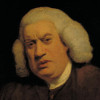“ Man is a being who, as belonging to the world of sense, has wants, and so far his reason has an office which it cannot refuse, namely, to attend to the interest of his sensible nature, and to form practical maxims, even with a view to the happiness of this life, and if possible even to that of a future. ”
Immanuel Kant, Critique of Practical Reason (1788). copy citation
| Author | Immanuel Kant |
|---|---|
| Source | Critique of Practical Reason |
| Topic | happiness future |
| Date | 1788 |
| Language | English |
| Reference | |
| Note | Translated by Thomas Kingsmill Abbott |
| Weblink | http://www.gutenberg.org/cache/epub/5683/pg5683-images.html |
Context
“No doubt our weal and woe are of very great importance in the estimation of our practical reason, and as far as our nature as sensible beings is concerned, our happiness is the only thing of consequence, provided it is estimated as reason especially requires, not by the transitory sensation, but by the influence that this has on our whole existence, and on our satisfaction therewith; but it is not absolutely the only thing of consequence. Man is a being who, as belonging to the world of sense, has wants, and so far his reason has an office which it cannot refuse, namely, to attend to the interest of his sensible nature, and to form practical maxims, even with a view to the happiness of this life, and if possible even to that of a future. But he is not so completely an animal as to be indifferent to what reason says on its own account, and to use it merely as an instrument for the satisfaction of his wants as a sensible being. For the possession of reason would not raise his worth above that of the brutes, if it is to serve him only for the same purpose that instinct serves in them;”
source


